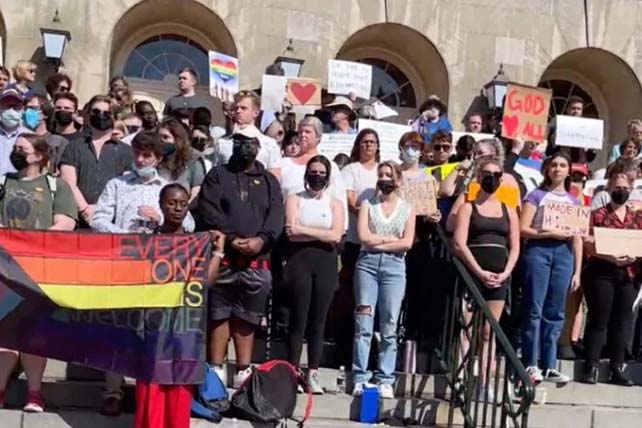“Me, as well as many Episcopalian students and faculty (and other ostracized denominations) are greatly concerned with the direction Samford appears to be heading regarding religious freedom and theological exploration,” a Samford student and president of the Alabama College Democrats told RNS in an email. “If Samford is not a place for all students to explore theology with spiritual honesty, I feel as if it begins to lose its integrity as a Christian institution accessible for all of God’s people.”
Taylor said in his video message that the removal of the student groups was not indicative of a new policy.
“(T)he boards that govern Samford have never supported anything but the traditional view of sexuality and marriage. Samford isn’t suddenly more biblically conservative on this issue.”
But advocates say that while Samford’s anti-LGBTQ stance might not be new, its rejection of ecumenism is.
The Rev. Joe Genau, pastor of Edgewood Presbyterian Church in Homewood, Alabama, and a UKirk co-leader, told RNS his group has partnered with Samford since at least 2016.
“Samford is maintaining that they have not made a change, and it’s abundantly clear there was a change given we were allowed on campus three years ago,” said Genau. He added that having LGBTQ-affirming ministries present at events like the ministry fair can be a lifeline for LGBTQ students.
RELATED: Southern Baptists Cut Ties With LGBTQ-Friendly Church
“So many of the students that I’ve worked with over the years, they’ve been hurt by the church. The church has told them they are not part of the Kingdom of God. Sometimes the church has said what Samford is saying, which is ‘We love you, but don’t live that way or we can’t fully love or accept you.’ And I’m coming from a congregation that says otherwise.”
SAFE Samford (Students, Alumni and Faculty for Equality), founded in 2011 by Samford graduate Brit Blalock, has been mobilizing in the wake of the ministry fair incident. The group launched a change.org petition, an open letter signed by clergy alumni of Samford and a letter writing campaign aimed at sharing LGBTQ-affirming testimonies with President Taylor. Members of SAFE Samford — whose closed Facebook group has just under 1,000 members — also joined in the student-led silent protest.
Blalock told RNS she was “gutted” by Taylor’s recent video. “I was particularly bothered by the statement that we love the LGBTQ students unconditionally, when there are very clearly conditions on that.”
Moses told RNS that Samford Prism, an unofficial LGBTQ student group, has been trying to spread the word about the safe space the group provides for LGBTQ students and allies.
“There’s a lot more urgency to be visible,” Moses told RNS. “In light of these policy enforcements, we want students to know there are people who care about them.”
In 2017, then-president Andrew Westmoreland blocked LGBTQ student group Samford Together from being officially recognized as a student group, despite a nearly unanimous vote of approval from Samford faculty and approval from student government.
Samford Prism was founded in 2019 to carry on the legacy of that group. In previous years, Samford Prism has been largely involved in behind-the-scenes efforts to win official approval. This semester, Samford Prism launched its Instagram account, which includes student testimonies, Christian LGBTQ-affirming resources and contact info for faculty who say they are safe people for LGBTQ folks.
“It’s the exclusion that’s the issue,” said Moses. “We’re not allowed to talk about our faith or have faith presented to us in an affirming manner.”
“Prism is there to create that space that is being taken away,” she added.
Prism doesn’t have university funding, can’t advertise via official university channels and risks getting shut down if they meet on campus, according to Moses. She said the group is still hoping to gain official university recognition but predicts the university’s recent actions mean it’s going to be an uphill battle.
When asked if she has any regrets about coming to Samford, Moses admits it’s a complicated question — while she has loved her professors and made lifelong friends, she laments that she’s had to fight for the right to express herself.
“When a student Googles ‘LGBTQ Samford,’ I just want the first thing to not be discrimination,” said Moses. “I want it to be Prism, or other LGBTQ groups, so they know they have people they can trust.”
This article originally appeared here.

